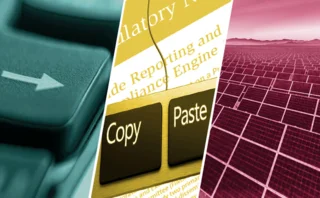
Volcker, FRTB and dual netting sets
The week on Risk.net, April 14–20 2017
DUAL NETTING SETS face bank pushback
ENERGY industry exploring blockchain
MIFID SI limits could be hardened
COMMENTARY: Trading shots with the Feds
Trading desks remain in the firing lines of regulators – both past and present. This week, Paul Volcker defended his eponymous rule to Risk.net in the face of widespread calls for it to be dismantled.
The former Fed chair tells Risk.net his prop-trading ban has already achieved its aim: “The effort has not been futile. The banks have eliminated their proprietary trading desks – they’re gone.” And he dismisses criticism of the unnecessary intricacy of his rule, asserting that regulators should throw more resources into its operation.
Despite the number and variety of opponents lining up to take pot shots at the rule, rolling it back will not be straightforward. Risk.net spoke with 17 regulatory sources who say outside outright repeal or revision, the most easy-to-obtain relief could be via a softening of its compliance regime.
Regardless of attempts to temper Volcker, trading desks’ structure remains under scrutiny as the Basel Committee on Banking Supervision’s Fundamental review of the trading book (FRTB) looms in 2019. Because of differences in the way trading desks and products are treated under FRTB, banks say they will need to rethink the structure of their businesses, in some cases starting with the trading desks they use to comply with the Volcker rule.
FRTB, of course, has attracted the attentions of its own posse of detractors. Its roll-out could be scuppered as the Trump White House and Republican lawmakers stoke fears that the US will renege on agreements to implement the rules.
Critics are stockpiling their objections to the proposals. Banks claim the impact of the new market risk capital rules is being incorrectly downplayed in regulatory analysis, although they are hoping to get a fresh hearing for their complaints after a change of leadership at the group responsible for the regulation. Dealers have been left frustrated by the Basel Committee’s response to questions on model backtesting and could focus their liquidity provision around commonly used benchmarks.
More recently, mathematical studies have cast further doubt on the FRTB’s profit and loss (P&L) attribution test (which the European Banking Authority plans to reboot). This backs up criticisms made by banks in Risk.net’s own FRTB survey, which put internal model approval at the top of the list of fears around the reform.
In addition, identical foreign exchange portfolios could attract wildly varying capital charges depending on which currency they are reported in – although workarounds are possible, according to research released this week.
STAT OF THE WEEK
QUOTE OF THE WEEK
“We do not want Pillar 1 to be reintroduced by the back door, calling it Pillar 2 but keeping many elements of Pillar 1. The reason why Basel actually concluded with the Pillar 2 charge is because you cannot standardise measurement of interest rate risk in the banking book and still make much sense of it” – Denisa Mularova, European Banking Federation
Further reading
Only users who have a paid subscription or are part of a corporate subscription are able to print or copy content.
To access these options, along with all other subscription benefits, please contact info@risk.net or view our subscription options here: http://subscriptions.risk.net/subscribe
You are currently unable to print this content. Please contact info@risk.net to find out more.
You are currently unable to copy this content. Please contact info@risk.net to find out more.
Copyright Infopro Digital Limited. All rights reserved.
As outlined in our terms and conditions, https://www.infopro-digital.com/terms-and-conditions/subscriptions/ (point 2.4), printing is limited to a single copy.
If you would like to purchase additional rights please email info@risk.net
Copyright Infopro Digital Limited. All rights reserved.
You may share this content using our article tools. As outlined in our terms and conditions, https://www.infopro-digital.com/terms-and-conditions/subscriptions/ (clause 2.4), an Authorised User may only make one copy of the materials for their own personal use. You must also comply with the restrictions in clause 2.5.
If you would like to purchase additional rights please email info@risk.net
More on 7 days in 60 seconds
Bank capital, margining and the return of FX
The week on Risk.net, December 12–18
Hedge fund losses, CLS and a capital floor
The week on Risk.net, December 5–11
Capital buffers, contingent hedges and USD Libor
The week on Risk.net, November 28–December 4
SA-CCR, SOFR lending and model approval
The week on Risk.net, November 21-27, 2020
Fallbacks, Libor and the cultural risks of lockdown
The week on Risk.net, November 14-20, 2020
Climate risk, fixing Libor and tough times for US G-Sibs
The week on Risk.net, November 7-13, 2020
FVA pain, ethical hedging and a degraded copy of Trace
The week on Risk.net, October 31–November 6, 2020
Basis traders, prime brokers and election risk
The week on Risk.net, October 24-30, 2020








